Real Estate App Development vs Web Development: Which is Right for Your Business?
November 18, 2024 • 146 Views • 18 min read
Bohdan Vasylkiv
CEO & Co-Founder
More and more real estate companies are deciding to create real estate app. Nevertheless, one of the most common disputes among potential PropTech solutions is choosing between real estate mobile app development and building a web app.
Both development approaches are great for many purposes, yet one of the most crucial benefits of both web and mobile development is their cross-platform nature. Any business agrees that cross-platform apps are ideal for the real estate industry due to several facts.
For instance, real estate web solutions are more user-friendly and can help reach a larger audience. Still, despite sharing such crucial features, real estate web and mobile apps differ greatly and provide many unique features and benefits.
So, what businesses should know when choosing between real estate mobile app development and real estate web solutions? To answer that, let’s examine the unique characteristics of each development approach first.
When to Choose Real Estate Mobile App Development?
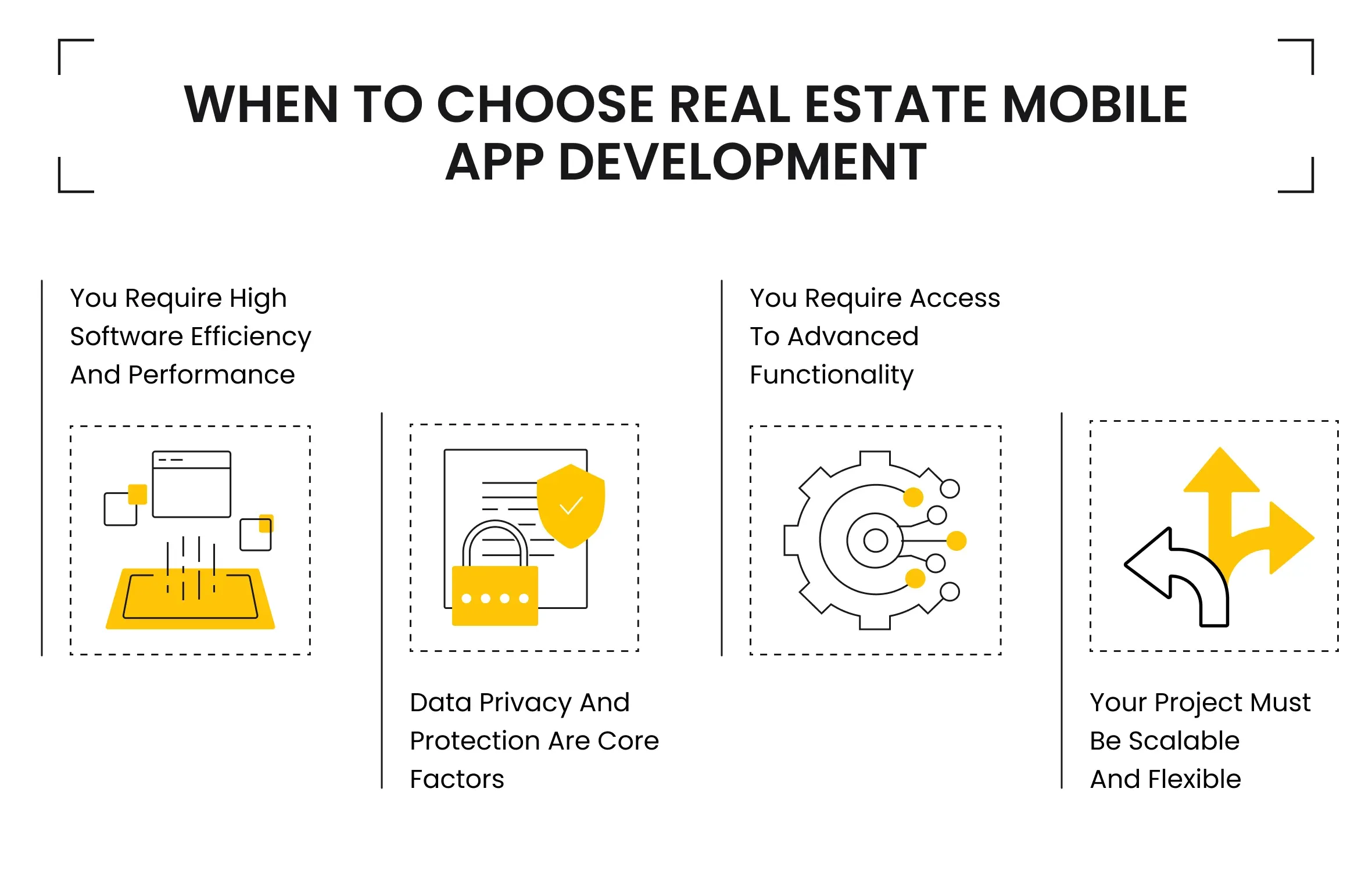
Real estate mobile app development aims to create efficient software applications for mobile devices. Yet, the types of such applications can vary significantly, changing the demands of development projects and the offered functionality. There are three main types of mobile applications:
- Native apps
- Hybrid apps
- Progressive Web Applications (PWA)
Native mobile apps are designed and developed for particular mobile operational systems, such as Android or iOS. Such software solutions offer access to all device features and functionality.
Therefore, native mobile development is an excellent choice for the most efficient app, capable of providing users with unique features and frequent updates. However, such development approaches have a crucial drawback: you must independently build a real estate app for each platform. For instance, if you want to create real estate app that is native to iOS and Android, you must develop each version independently from scratch.
Hybrid apps are an excellent alternative for cases when you want to create mobile applications for both platforms but have limited resources or strict deadlines.
These apps are usually native-like, providing users with the most crucial and general functional options. Compared to native apps, they offer fewer unique features but require less building effort. For example, React Native hybrid application development allows developers to create a core version of an app for both platforms, requiring just a few code adjustments to fit the mobile OS.
Progressive web applications combine web and mobile development. They are web apps that can be downloaded and installed on a mobile device as a standalone application. They offer fewer device-specific or advanced features and stick with core functionality and services.
Still, they can be accessed from almost any device or platform, making them the ultimate choice for building simple yet multiplatform real estate applications like online marketplaces.
So, what real estate industry use cases are the most suited for real estate mobile app development, and what benefits it can provide?
Real Estate Software App Efficiency and Performance
One of the most noticeable reasons to invest in real estate mobile app development is its high efficiency and performance.
Real estate mobile applications are much more independent of factors like internet connection speed, server capabilities, etc. Instead, they primarily utilize mobile device capabilities, giving more flexibility and accessible resources for companies:
Modern standalone mobile applications can require up to a few GB of device memory, allowing software developers to enable whatever idea they have, regardless of resource usage. As a result, features like full-fledged VR/AR tours of the property, gamification, caching data for offline use, etc., can be enabled.
Besides, real estate mobile app development suggests better end-product performance: due to the specifics of software development, all types of mobile software apps are more efficient and faster than web-based solutions.
Combined with the fact that app performance directly impacts the user experience and satisfaction, you should consider mobile application development services when you want to make your business as user-friendly as possible.
Data Privacy and Protection
Another vital reason to choose real estate mobile app development over web-based alternatives is data privacy and security concerns.
Building native and hybrid mobile apps requires starting from scratch. Your final solution will be at least partly unique and custom, which usually makes it harder for hackers to find backdoors or security vulnerabilities. This is especially true if you find a reliable and experienced technology partner for future real estate app development.
Besides, standalone applications can be additionally protected by integrating extra security measures and utilizing access to advanced platform-related functionality like FaceID, its alternatives, or other elevated features.
Finally, real estate mobile app development provides more control and integration options. With higher software protection, you can allow in-app purchases or store more information about your users, with much fewer risks of leaks or third-party data mining.
Access to Unique and Advanced Functionality
Another reason to build a real estate app is the access to advanced functionality.
Applications designed for mobile devices and created using appropriate technologies like React Native or various platform-specific technologies allow developers to integrate more complex functionality and upscale the app, making it more unique and personalized.
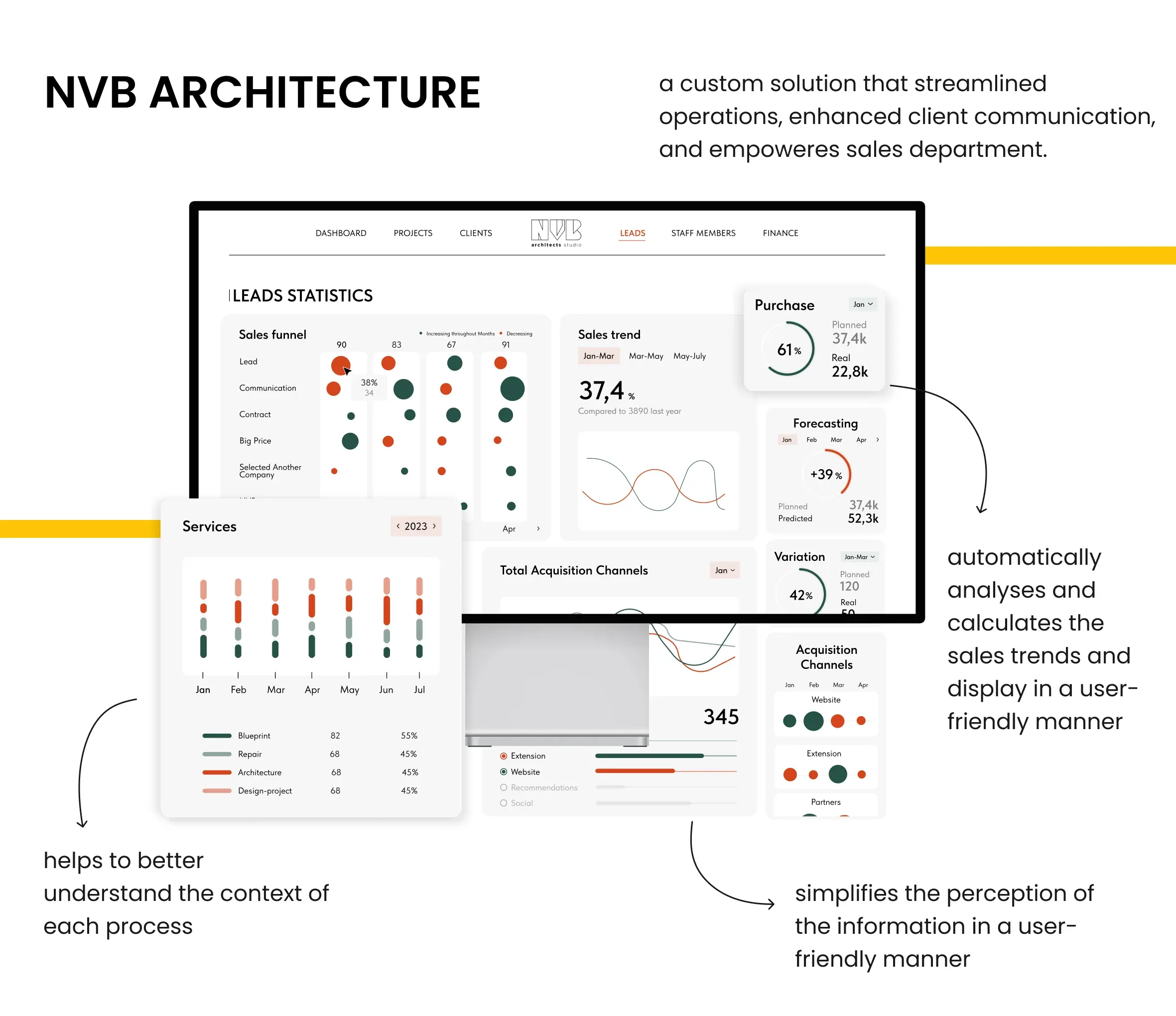
Various features like access to a camera, the possibility to make photos and videos in-app, FaceID and other such features can be great addition to real estate apps. For example, if you aim to create a user-friendly real estate platform for property renting, you can allow tenants to send photos of issues like broken couches, scratches on the door, and so on. Or, they can send a photo of where they hid the keys if they couldn’t meet the landlord when they moved out.
Variety of Real Estate Mobile App Development Options
Finally, there are countless options for mobile development, starting with technologies to use and ending with development approaches and app types like native, hybrid, or progressive mobile applications.
So, mobile development satisfies any business request and works fine in various scenarios or terms. Some real estate mobile app development projects can offer a highly unique and seamless user experience by developing native mobile apps. At the same time, others can be less tech-savvy solutions to fit limited budgets.
To sum up, the variety of real estate mobile development options is vast, and any business can find the ideal solution for its needs. If you are looking for great flexibility, customization, and scalability options, you should seriously consider building mobile apps for real estate.
When to Choose Real Estate Web Development
Now, it's time to discuss real estate web development and when it might be better than mobile apps for your business.
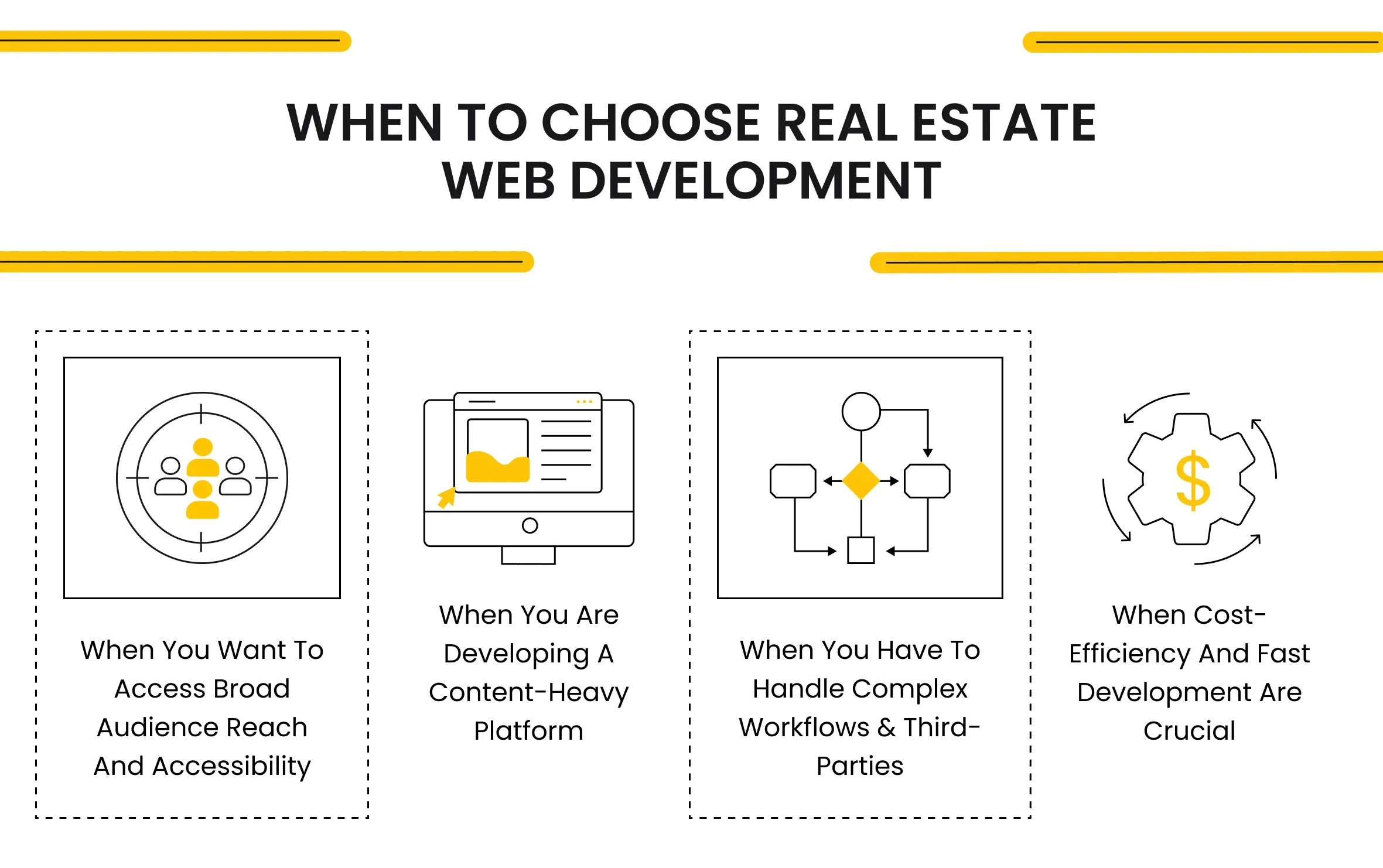
Long story short, the list of reasons for web development for real estate includes:
- Broad audience reach and accessibility
- Solutions for content-heavy platforms
- Dealing with complex workflows and third-party integrations
- Outstanding cost-efficiency and fast development
Broad Audience Reach and Accessibility
This single feature can explain the popularity of web-based real estate platforms.
If your main reason for building a real estate app is to increase the audience reach, you should find a real estate web developer. Web applications and websites are the most popular projects in the IT industry and are used by billions of people daily.
It is tough to compete with web-based platforms in terms of audience reach because of their accessibility: users have no bounds or limitations in accessing a platform from any device they want. At the same time, even hybrid mobile apps require at least having a smartphone.
So, if you want to increase your real estate company's online presence and potentially reach a new audience, web development services are an ideal choice.
Content-Heavy Platforms
An additional benefit of real estate web development is the possibility of creating whatever type of software to serve different purposes. It can be a real estate blog about the innovations in the industry, a forum for discussing different news and changes, etc.
However, web applications are not always open to everyone. You can easily choose this platform for internal business usage, like real estate CRM software development. As a result, your team will have an easily accessible yet secured management system for tracking various business processes.
Besides, web platforms can handle a lot of content, regardless of its type and complexity. Once again, there are countless variations of platforms on the Web, starting with forums and personal websites and ending with complex web applications for watching videos like YouTube or Netflix.
Complex Workflows and Third-Party Integrations
Web development for real estate also offers multiple solutions for handling resource-intensive tasks, such as applying cloud computing and improving website performance.
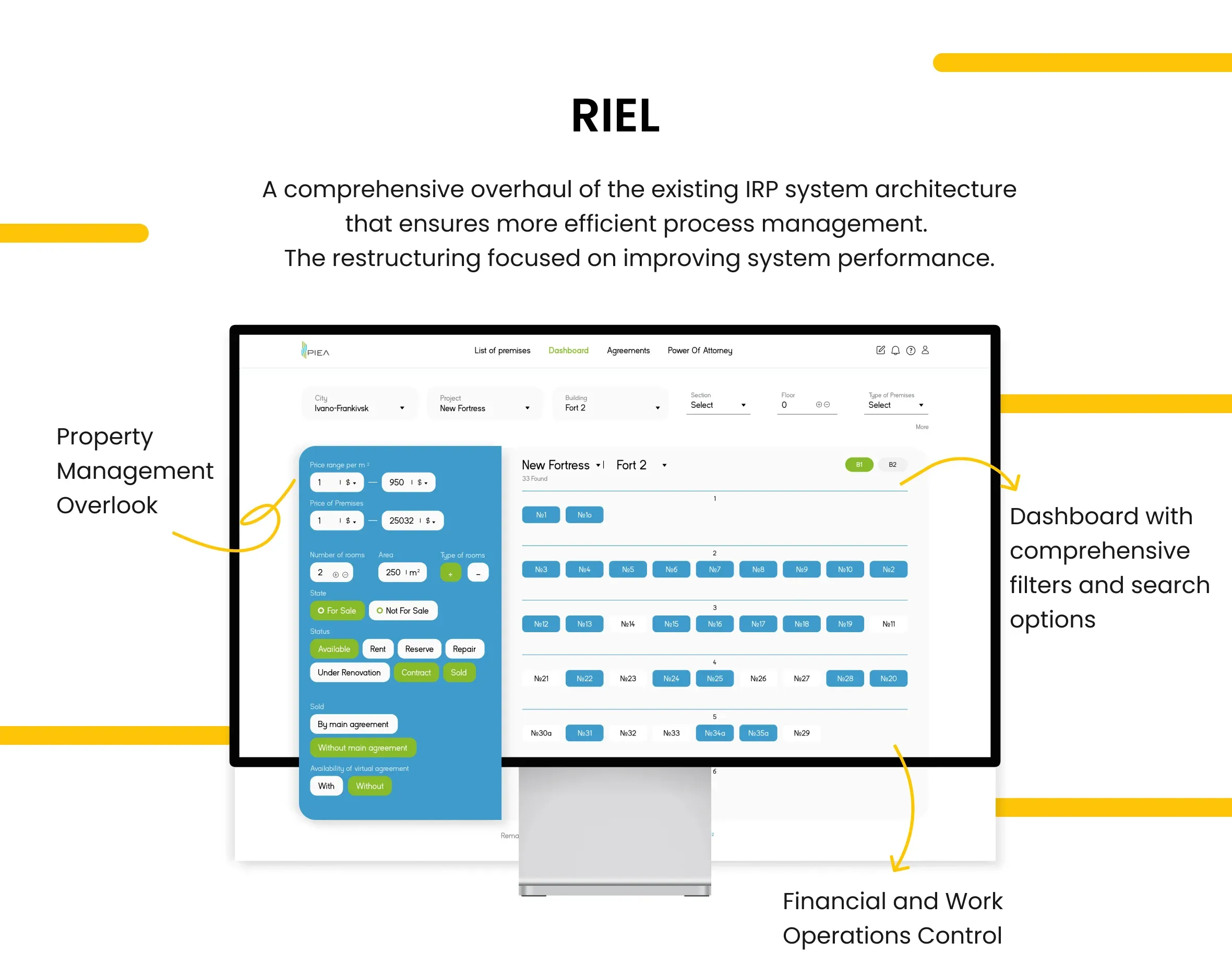
Any real estate web developer will agree that web platforms are great for dealing with complex workflows and are highly compatible with third-party solutions. You can easily integrate almost any third-party service. This is extremely useful for various management systems, like the aforementioned CRMs or property management software, helping to streamline data sharing among various standalone software apps.
Such features of real estate web development are the main reasons for choosing it for creating web-based real estate management systems.
Cost-Efficiency and Faster Development
Finally, web development is much faster and requires fewer resources to succeed.
First, many web developers are available, making it easy to gather a full-fledged team in no time. Besides, web development is considered much easier than other development projects. Plainly speaking, web development is simple, fast, and cheap, still offering many functional options and high efficiency.
Summing up all the above, real estate web development is an excellent choice for startups and small companies with limited budgets.
Factors to Consider When Choosing Between Real Estate Web and App Development
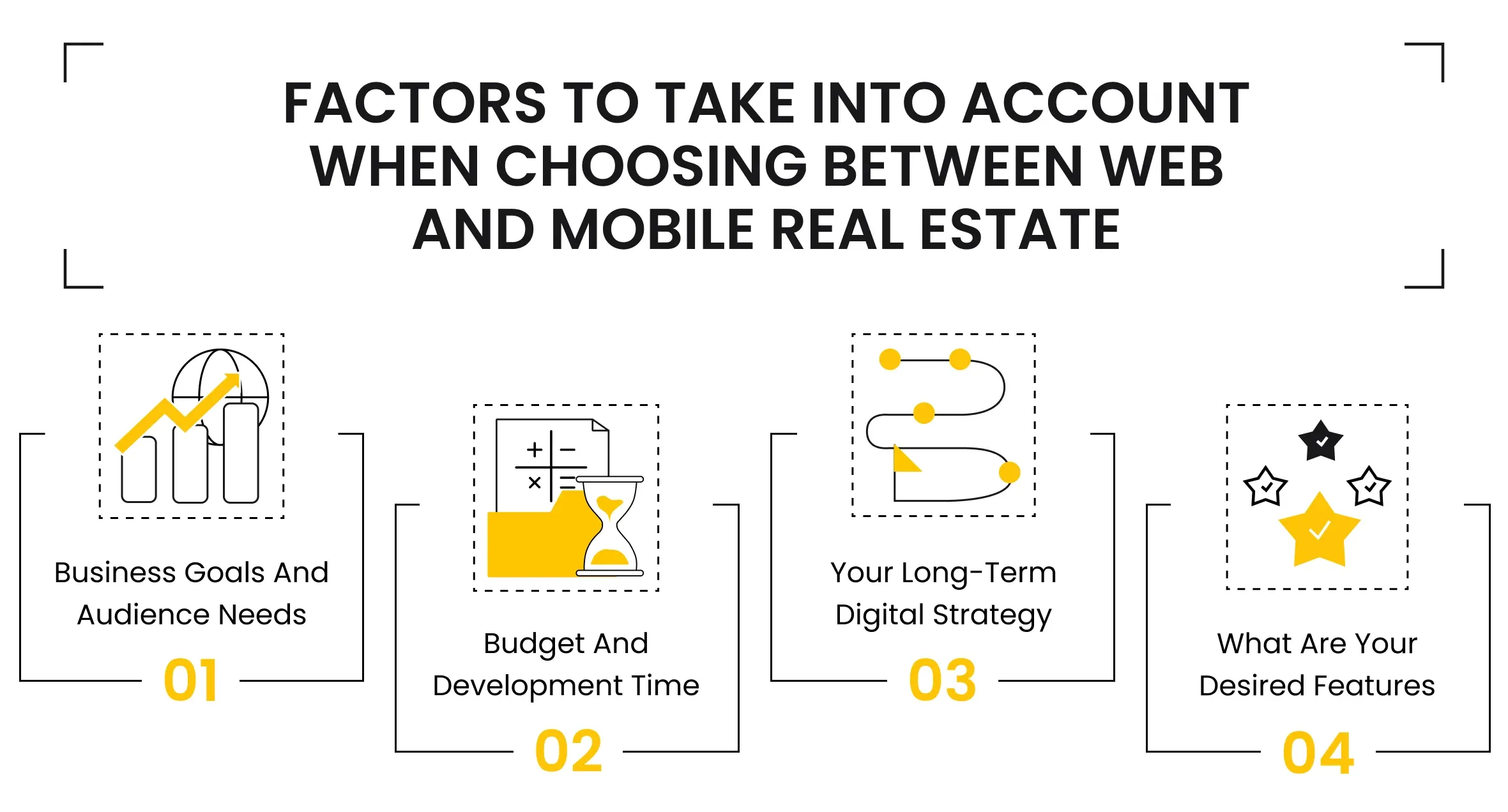
So, what must you consider when choosing between mobile and web development for real estate? Simply put, here is a checklist of the main factors for making the right choice:
- Business goals and audience needs
- Budget and timeline
- Long-term digital strategy
- Desired features
Business Goals and Audience Needs
Before planning your software project, research your target audience and its needs and define your core business goals that require software solutions.
Having such definitions before your eyes will help you better estimate projects and choose a more suitable software type.
For instance, if your main goal is to increase the audience's reach, web real estate development would be a better choice. However, if you also want to provide users with unique and advanced functionality, you must consider mobile development.
Budget and Timeline
After establishing and defining the core business goals and target requirements, you can plan and estimate software development.
Clarifying your timeline expectations and accurately estimating your budget is crucial. Only after establishing available time and resources you can start planning your real estate development project and choose between real estate web and mobile development.
Long-Term Digital Strategy
Additionally, you need to plan your future digital strategy: how and where would you advertise your app? What will be the next step after delivering your software? Will you scale software and develop versions for other platforms? How will you maintain the software application?
Long story short, there are countless questions worth answering. This will help to ensure that the chosen software development approach is correct for your real estate business.
Desired Features
Finally, after defining the type of your software, knowing the budget and development timelines, knowing your goals and how to achieve them, and being aware of the audience's expectations, you can start designing your future real estate application.
One of the most crucial aspects of this step is to define the desired and must-have features and learn whether it is possible to embody them in terms of your project. The best idea is to contact a reliable real estate app development company like Incora, which can advise and consult you during software development or even build your desired product.
Hybrid Approach: When Might Both Web and App Development Be Ideal?
We should also mention a hybrid approach, combining both web and mobile development for real estate.
To be honest, the best choice is not to choose at all. Most real estate businesses steeped in the IT world can relate. For instance, Airbnb offers both a website and a mobile application, combining the benefits of each strategy. Such a hybrid approach is the ultimate and flawless solution that offers the benefits of mobile and web real estate applications.
Nevertheless, apart from advantages, it also brings many challenges. One of the most influential factors is the extreme initial investment and expenses, which continue even after product delivery: you will have to spend resources to support, update, and maintain all versions of your real estate software.
Besides, you will need considerable development and support teams on-premises, including high-level experts, to manage various processes.
So, the best way to create a hybrid real estate app is to be gradual and persistent, starting with one version of an app, and gradually scaling your business and software.
What’s your impression after reading this?
Love it!
1
Valuable
1
Exciting
1
Unsatisfied
1
FAQ
Let us address your doubts and clarify key points from the article for better understanding.
What types of real estate software are best suited for mobile apps?
Real estate software best suited for mobile apps includes:
- Property Search Apps (e.g., Zillow, Realtor.com) for buyers and renters.
- CRM Software for managing client relationships on-the-go.
- Lead Generation Tools to capture and follow up with prospects.
- Transaction Management Apps to handle contracts, documents, and timelines.
- Property Management Apps for landlords to track tenants, maintenance, and payments.
- Marketing Tools for social media, virtual tours, and listings.
These prioritize user-friendly interfaces and real-time updates.
What are the key benefits of having a web-based real estate software solution?
Key benefits of web-based real estate software include:
- Accessibility: Access data anytime, anywhere.
- Collaboration: Easy sharing and teamwork.
- Cost Efficiency: No installation or hardware requirements.
- Scalability: Adaptable as your business grows.
- Real-Time Updates: Instant access to the latest information.
- Data Security: Centralized and secure storage.
Can I integrate third-party services with my real estate software on both platforms?
Yes, most real estate software supports integration with third-party services like CRM tools, MLS platforms, payment gateways, and marketing solutions on both web and mobile platforms, ensuring seamless functionality and efficiency.
Are there any cost differences between developing a real estate mobile app and a web platform?
Yes, developing a mobile app often costs more than a web platform due to platform-specific designs (iOS/Android), additional testing, and maintenance, whereas web platforms typically require a single responsive design.
YOU MAY ALSO LIKE
Must-Have Features for Successful Real Estate Mobile App Development in 2024
Let’s talk!
This site uses cookies to improve your user experience. Read our Privacy Policy
Accept
Share this article